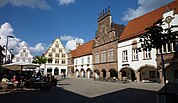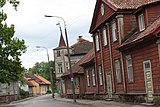
Back Kleinstadt ALS Villa AN بلدة Arabic مركز (بلد) ARZ Villa (población) AST Qəsəbə Azerbaijani شهرک AZB Banwaan BCL Мястэчка Byelorussian Мястэчка BE-X-OLD
This article needs additional citations for verification. (October 2021) |
A town is a type of a human settlement, generally larger than a village but smaller than a city.[1]
The criteria for distinguishing a town vary globally, often depending on factors such as population size, economic character, administrative status, or historical significance. In some regions, towns are formally defined by legal charters or government designations, while in others, the term is used informally. Towns typically feature centralized services, infrastructure, and governance, such as municipal authorities, and serve as hubs for commerce, education, and cultural activities within their regions.
The concept of a town varies culturally and legally. For example, in the United Kingdom, a town may historically derive its status from a market town designation or royal charter, while in the United States, the term is often loosely applied to incorporated municipalities. In some countries, such as Australia and Canada, distinctions between towns, cities, and rural areas are based on population thresholds. Globally, towns play diverse roles, ranging from agricultural service centers to suburban communities within metropolitan areas.







